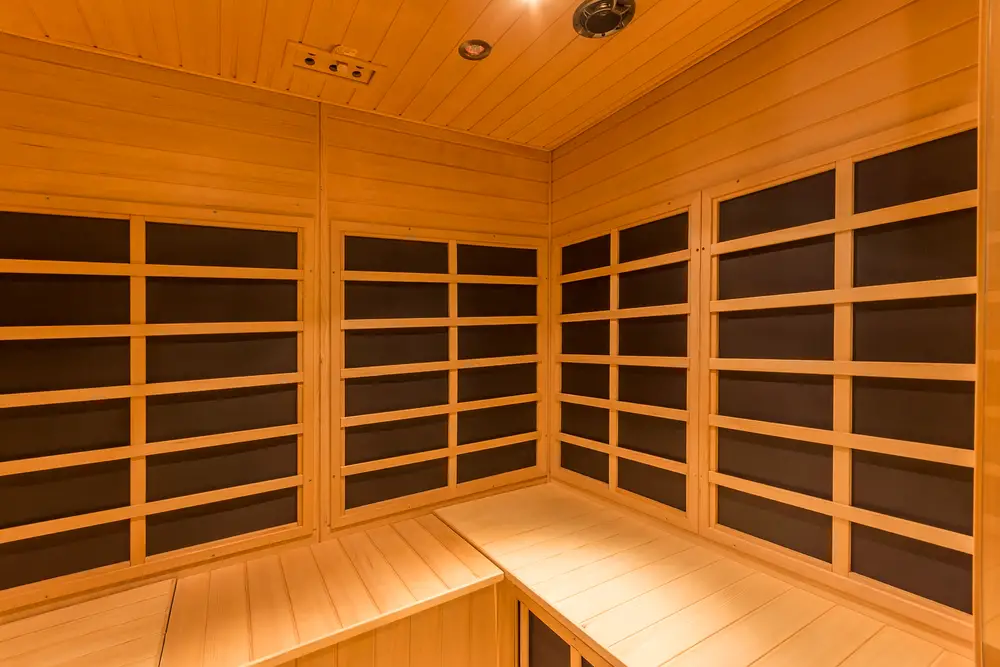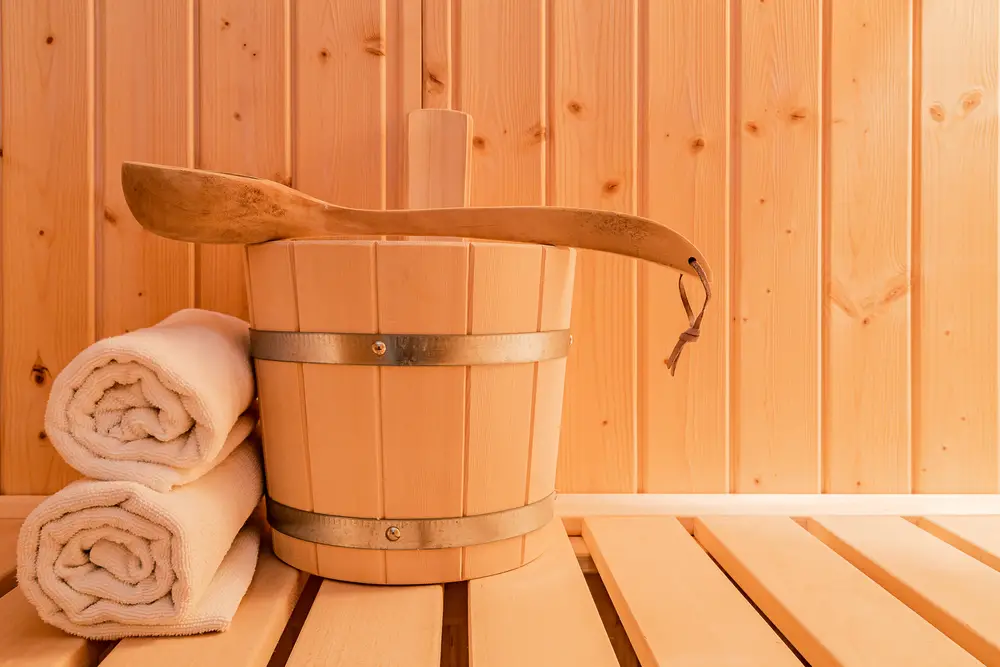If you’re looking to increase the value of your home and improve your personal wellness, investing in a sauna may be worth considering.
Studies have shown that a well-designed sauna that fits in with your property’s current features can add value to your home. Additionally, saunas offer various health benefits that could appeal to potential buyers and boost your property’s overall value.
If you’re interested in learning more about how saunas can affect home values, the following sections provide additional information on the benefits and factors to consider before installing one.
What are saunas and what are their benefits?

Saunas are structures specifically designed to promote relaxation, cleansing, and healing. They can be found in various locations such as gyms, spas, hotels, and private homes, and are typically small rooms or buildings that generate heat by heating rocks or other materials, producing steam or dry heat in the room.
The primary benefit of saunas is their ability to reduce stress levels and promote relaxation. The heat can lower blood pressure and ease muscle tension while stimulating the production of endorphins, natural painkillers that provide a sense of well-being. Saunas also aid in flushing out toxins from the body through sweating, which can enhance skin health and boost the immune system.
Moreover, saunas can offer several other benefits such as improved cardiovascular function, increased circulation, and relief from joint pain and stiffness. Regular use of saunas has also been associated with a reduced risk of chronic conditions such as cardiovascular disease, dementia, and respiratory illnesses.
Aside from the health benefits, saunas can also provide social advantages by serving as a space for people to gather and connect with each other. Some saunas even offer group sessions or events.
Related Read: Home Sauna Types – Traditional vs Infrared
What do research studies and statistics say about saunas’ impact on home value?
The impact of saunas on home value is a topic of interest among homeowners and real estate professionals. Research studies and statistics provide valuable insights into the effects of saunas on home value, which individuals planning to install saunas in their homes should consider.
According to a study by the National Association of Realtors, adding a sauna to a home can increase its value by up to 4%. The study also found that the increase in home value is proportional to the cost of the sauna installation. Therefore, the higher the cost of the sauna installation, the greater the increase in home value.
Similarly, a study by the University of Wisconsin-Madison showed that homes with saunas tend to sell faster than homes without them. The study found that homes with saunas were on the market for an average of 38 days, while homes without saunas remained on the market for an average of 68 days.
It is important to note, however, that the impact of saunas on home value may vary depending on the location and preferences of potential buyers. For instance, homes with saunas may be more appealing in colder climates, where the use of saunas is common. Conversely, potential buyers in warmer climates may not view the inclusion of a sauna in a home as necessary.
What are the factors that affect saunas’ impact on home value?
Saunas are a popular addition to many homes, providing a relaxing and therapeutic experience for homeowners. However, several factors come into play when determining their impact on home value.
One important factor to consider is the quality of the sauna itself. A well-made sauna using durable materials is likely to be more attractive to potential home buyers and can increase the value of a home. Conversely, a poorly constructed sauna or one that requires high maintenance may detract from a home’s value.
Another crucial factor to consider is the location of the sauna within the home. A sauna located in a private, spa-like setting such as a master bathroom or dedicated spa room can be a selling point for luxury-minded buyers, while a sauna located in a more public area, such as a basement or garage, may be less desirable.
The size of the sauna can also play a role in its impact on home value. A larger sauna may be seen as a more luxurious feature and could potentially increase the value of a home, while a smaller sauna may have less impact.
Ultimately, the impact of a sauna on home value will depend on a variety of factors, including its quality, location, size, and the preferences of potential buyers in the local market.
What are the considerations to keep in mind before adding a sauna to your home?

Adding a sauna to your home can be an excellent way to promote your health and relaxation. However, there are several important considerations to keep in mind before making this investment.
Firstly, it’s crucial to consider the available space in your home. Saunas can take up a significant amount of space, so you’ll need to ensure that you have enough room to accommodate one without making your home feel cramped or cluttered.
Another vital consideration is the type of sauna you want to install. There are various types available, such as traditional saunas, infrared saunas, and steam saunas, each with its own benefits and drawbacks. To determine which one will best suit your needs, research the different options, and consult with a professional.
Also, the cost of installing a sauna is a crucial factor to consider. This will depend on the type of sauna you choose, the size of your home, and the level of customization you want. To avoid overspending, set a budget and stick to it.
Besides, maintaining and cleaning your sauna regularly is essential to keep it functioning correctly and prevent costly repairs.
Lastly, it’s essential to consider the potential impact on your home’s value. While a well-maintained sauna can be an attractive feature to potential buyers, a poorly installed or maintained sauna can actually decrease your home’s value.
What are the best practices for adding a sauna to your home and increasing its value?

If you’re thinking about adding a sauna to your home, there are a few best practices to keep in mind that can boost its value.
First and foremost, consider the location. Choose a quiet, private area free from any distractions or noise. If possible, select an area close to a bathroom for easy access to shower facilities.
Size matters when it comes to saunas. Make sure the sauna is large enough to comfortably accommodate at least two people with enough space to stretch out and move around.
For walls and benches, cedar is the most popular choice due to its mold and mildew-resistant properties and pleasant aroma.
You can opt for either an electric or wood-burning stove for heating, depending on your preference. It’s important to consult with a professional electrician or installer to ensure correct installation and safety.
Proper ventilation is also critical for a safe and comfortable sauna experience. Consider adding a small window or vent to help with this.
Finally, if you’re looking to enhance your sauna experience, consider adding features like lighting, sound systems, or aromatherapy.
By following these, you can create a safe, comfortable, and enjoyable sauna experience for you and your family while increasing the value of your home. Don’t hesitate to consult with a professional installer or contractor to ensure that your sauna meets all safety standards and is installed correctly.
What are some additional tips for increasing the value of your home through sauna installations?
Installing a sauna in your home can greatly enhance your quality of life and increase the value of your property. Saunas have become increasingly popular in recent years, making them a desirable selling point for homes. Here are some tips to consider when installing a sauna in your home to maximize its value:
- Choose the optimal location: The location of your sauna is crucial. Opt for a quiet and secluded area where people can relax without disturbance. Basements, garages, or backyard spaces are often ideal locations.
- Select the appropriate size: Make sure to choose a sauna that fits well in your home. If you have a smaller property, a compact sauna can be the best option, while larger homes can accommodate a larger sauna.
- Consider high-quality materials: Cedar or redwood can add value to your sauna and home. These materials offer superior durability and insulation.
- Invest in features: Enhance your sauna with features such as lighting, sound systems, and digital controls to make it more attractive and increase its value.
- Proper maintenance is key: Regularly maintaining your sauna can help keep it in good condition, improving its longevity and overall value.
Installing a sauna in your home can be a smart investment to increase its value, provided you choose the right location, size, materials, and invest in features and maintenance.
Also Read: Home Sauna Building Materials – Key Issues & Considerations
Key Takeaway
Adding a well-designed sauna that complements your property’s current features can increase the value of your home by up to 4%, according to a study by the National Association of Realtors. Not only do saunas provide relaxation and cleansing, but they can also alleviate stress, ease muscle tension, and strengthen the immune system.
Furthermore, saunas can offer various social benefits and are a popular addition to many homes nowadays. When planning to add a sauna to your home, it’s important to consider factors such as its quality, location, size, and the preferences of potential buyers in your local market.
